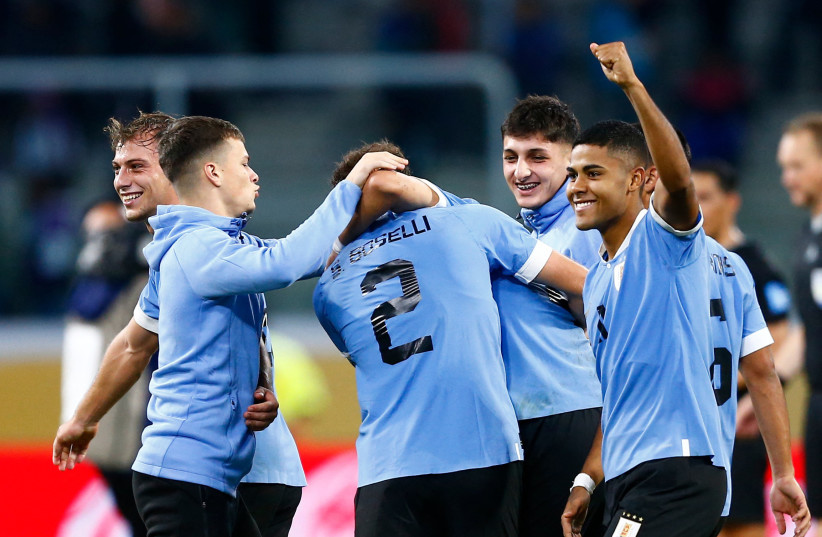Uruguayan Jewish soccer fans face World Cup dilemma: Root for Uruguay or Israel?
BUENOS AIRES (JTA) — Over the past two weeks, Israel’s soccer team has thrilled South American Jews with a historic run at the FIFA U-20 World Cup in Argentina.
The thousands of locals who have shown up with Israeli flags have watched the under-20 team, in their first-ever appearance in the tournament, repeatedly come from behind to defeat highly-ranked countries such as Japan and Brazil.
But in Thursday’s semifinal match, Israel is set to take on Uruguay — leaving many Uruguayan-Jewish fans at home and around the world with a difficult decision.
“I can’t choose, it’s the hardest question in my life,” said Gustavo Ram, a Uruguayan living in Israel who is the brother of former professional Uruguayan-Israeli tennis player Andy Ram. “I don’t know how I will react. I have Israeli children so I don’t want to scream for the Uruguayan goals in front of them.”
The diehard soccer fan married an Israeli after immigrating 30 years ago.
 FIFA U20 World Cup Argentina 2023 – Quarter Final – United States v Uruguay – Estadio Unico Madre de Ciudades, Santiago del Estero, Argentina – June 4, 2023 Uruguay players celebrate after the match (credit: Matias Baglietto/Reuters)
FIFA U20 World Cup Argentina 2023 – Quarter Final – United States v Uruguay – Estadio Unico Madre de Ciudades, Santiago del Estero, Argentina – June 4, 2023 Uruguay players celebrate after the match (credit: Matias Baglietto/Reuters)“I have very strong roots in both countries, I don’t know,” he added. “It’s hard, really hard.”
Latin American Jewish communities strongly pro-Israel
Strong pro-Israel sentiment is common throughout Latin America’s large Jewish communities in countries such as Uruguay, Argentina and Brazil. Jewish schools are strongly Zionist and many offer programs for students to travel and study in Israel.
Many of these communities also cultivate a fervent love of sports. The main hubs of Jewish communal life in these countries are often the local sports clubs, which double as community centers and have spaces named after Israeli politicians.
But Javier Jacubovsky, executive director of the Hebraica Macabi club in Montevideo, said that Uruguayans are also “very proud and nationalistic.”
“It’s also true that it is a different feeling with Israel, different to having any other country in front,” he said. “But we always want Uruguay to win.”
Daniel Baikovicius, a Uruguayan businessman and swimmer who represented his country at last year’s Maccabiah Games in Israel, noted that the win would mean more for Israel, which has only ever appeared in one other World Cup: the general edition of the tournament, in 1970. Uruguay, perennially ranked among the world’s best in soccer, has twice been runner-up in the U-20 World Cup and has won the general World Cup twice, but not since 1950.
“To be honest, the truth is that I want Uruguay to win. On the other hand, I understand that it would be unique for Israel to reach the finals in a global soccer championship. Uruguay has already more experience, more victories in soccer… for Israel it is more special,” Baikovicius said.
The team’s dramatic success has inspired fans back home, and the Jewish Telegraphic Agency learned that Israel’s minister of culture and sport, parliament member Miki Zohar, will attend Thursday’s game in La Plata. Several Israeli fans are flying in, too, including former Israeli soccer star Haim Revivo, whose son Roy is on the country’s under-20 squad.
Aviner Fishhof, Israel’s consul in Uruguay, had a diplomatic answer to the question of who will win.
“We are very excited, the Israeli team has gone so far in this tournament. I’m sure that we will have a very good game,” he said. “May the best team win.”
Jana Beris, a Uruguayan-born journalist who now lives in Modiin, Israel, was similarly diplomatic: She said she wants a draw, something that’s impossible by this stage of the tournament.
“What I want the most is to see each team singing the anthems… both, together, on the pitch! What more can we ask for?” she wrote on her website Seminario Hebreo Jai. She titled the piece “The emotion of seeing the two light blues” on the field — a reference to the fact that both teams wear the same color jerseys, in light blue and white.
Uruguay’s Jewish community
Uruguay has about 15,000 Jews, according to the Latin American Jewish Congress, in a total population of 3.4 million. It was the first South American country to officially recognize the state of Israel and was home to the first Israeli embassy in Latin America, established in 1948.
Thursday will ignite a party atmosphere in Jewish communities in Uruguay and neighboring countries. But many Uruguayan Jews, including Roby Schindler, the president of Uruguay’s central Jewish institution (the Comité Central Israelita de Uruguay), are also traveling to the game from Montevideo.
“It’s just a football match, it’s a party. I hope it will serve to unite people and not separate,” Schindler said.
But he added: “I want Uruguay to be the world champion, and I also want Israel to win third place.”





Comments are closed.